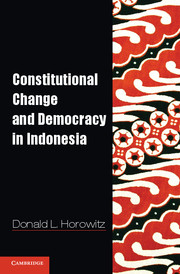Book contents
- Frontmatter
- Contents
- Preface
- Map of Indonesia
- Glossary
- 1 A Distinctive Path
- 2 Democratization Before Renovation
- 3 Creeping Reform
- 4 A Game of Inches
- 5 Anomalies, Ironies, Regularities, and Surprises
- 6 The Shape of the New System
- 7 Low-Quality Democracy and Its Discontents
- 8 Causes, Consequences, and the Consequences of the Consequences
- Index
- References
6 - The Shape of the New System
Published online by Cambridge University Press: 05 February 2013
- Frontmatter
- Contents
- Preface
- Map of Indonesia
- Glossary
- 1 A Distinctive Path
- 2 Democratization Before Renovation
- 3 Creeping Reform
- 4 A Game of Inches
- 5 Anomalies, Ironies, Regularities, and Surprises
- 6 The Shape of the New System
- 7 Low-Quality Democracy and Its Discontents
- 8 Causes, Consequences, and the Consequences of the Consequences
- Index
- References
Summary
Following the 2004 national elections and the provincial and regional elections held from 2005 to 2008, the shape of the new political system became fairly clear. It was modified somewhat by legislation put in place for subsequent elections but, for the most part, not in fundamental ways, although some electoral-law changes enacted in 2012 could have a significant impact. The contours of the system can be appraised by examining the presidency, the role of parties in the national legislature, their role in regional elections and regional legislatures, the allegiances of voters, and the evolving party configuration in national elections.
The presidency became a strong office, which all the large parties aspired to occupy, but it was not a wholly unified office. We have observed that the need for a coalition ticket crossing lines between ethnic and religious streams made the vice president a potential rival to the president. This became a millstone that Yudhoyono, the incumbent president, was able to cast off in 2009.
Within the DPR, we have also noted, the president, as head of a weak party from 2004 to 2009, was dependent for legislative support on other parties, most notably Golkar, the party of his vice president. But the legislature continued to hover somewhere between a model of entirely fluid coalitions, on the one hand, and government and opposition, on the other, but certainly closer to the former.
- Type
- Chapter
- Information
- Constitutional Change and Democracy in Indonesia , pp. 165 - 206Publisher: Cambridge University PressPrint publication year: 2013

